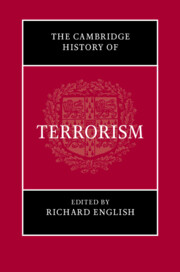Book contents
- The Cambridge History of Terrorism
- The Cambridge History of Terrorism
- Copyright page
- Contents
- Figures
- Tables
- Acknowledgements
- Contributors
- Part I Introduction
- Part II Frameworks and Definitions
- 2 History and the Definition of Terrorism
- 3 Terrorism, History and Periodisation
- 4 Terrorism, History and Regionalisation
- 5 A Processual Approach to Political Violence
- 6 Terrorism, History and Neighbouring Disciplines in the Academy
- Part III Historical Case Studies in Terrorism
- Part IV Thematic Essays
- Part V Conclusion
- Index
- References
4 - Terrorism, History and Regionalisation
from Part II - Frameworks and Definitions
Published online by Cambridge University Press: 07 May 2021
- The Cambridge History of Terrorism
- The Cambridge History of Terrorism
- Copyright page
- Contents
- Figures
- Tables
- Acknowledgements
- Contributors
- Part I Introduction
- Part II Frameworks and Definitions
- 2 History and the Definition of Terrorism
- 3 Terrorism, History and Periodisation
- 4 Terrorism, History and Regionalisation
- 5 A Processual Approach to Political Violence
- 6 Terrorism, History and Neighbouring Disciplines in the Academy
- Part III Historical Case Studies in Terrorism
- Part IV Thematic Essays
- Part V Conclusion
- Index
- References
Summary
There is a lack of empirical as well as theoretical literature examining the ways that terrorism spreads across different regions over different historical periods. This chapter looks to address one aspect of this deficit in the scholarship by locating the interrelationship between regionalisation and terror in its historical context. In doing so, it will examine the limitations of thinking about the regionalisation of terror in historical terms as well as the ways that the historical method enables us to understand more clearly some of the main aspects of the issue. In particular, the chapter will assess the relationship between terrorism, history and regionalisation in terms of a number of distinct but overlapping factors: the connection between the nation state, non-state actors and the ‘new’ terrorism; and transnationalism and the contribution of region-specific factors in the formation, evolution and operational effectiveness of terror groups. Despite the absence of much relevant literature, these important issues will be placed in their historical context and will be examined in terms of their historical continuity as they relate to the regionalisation of terror.
- Type
- Chapter
- Information
- The Cambridge History of Terrorism , pp. 81 - 105Publisher: Cambridge University PressPrint publication year: 2021



